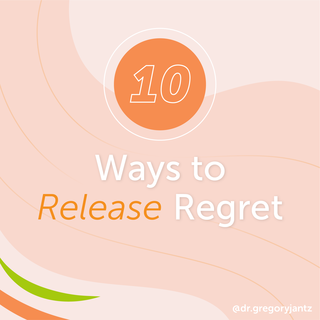Career
10 Ways to Release Regret
How you can work through and release regrets.
Posted February 24, 2022 Reviewed by Vanessa Lancaster
Key points
- Resolve not to live in the past and to forgive yourself.
- As you seek to release heavy feelings, work to counterbalance anger, fear, and guilt with optimism, hope, and joy.
- Exercises in intellectual, relationship, physical, and spiritual support can help you reclaim a healthy life.
Few people arrive at adulthood without regrets. You might have a handful of regrets and know they can keep you stuck, rob you of joy, and negatively affect your relationships moving forward.
When you experience an act of betrayal, whether you committed the act or suffered the consequences of another person’s offense, you will likely have feelings of remorse and regret. But that doesn’t mean you need to be burdened by them throughout your life. You can work through your regrets and release them, which will give you freedom and joy.
Consider These Ten Ways to Let Go of Regret

1. Resolve not to live in the past. Regret keeps us stuck in the past as we lament failures and missed opportunities. We ruminate about what might have been and miss out on the joy of living today when we’re haunted by the failures of yesterday.
2. Don't dwell on your mistakes. Dwelling on mistakes is like putting them under a microscope, which distorts reality and makes everything seem bigger than it really is.
3. Forgive yourself. Recognize that regret is a form of unforgiveness of yourself. It may be easier to forgive others than yourself. But releasing yourself from guilt and shame is a key to moving beyond regret.
4. Strive for self-acceptance. You have made mistakes, maybe bad ones, but that doesn’t mean you’re defined by those blunders. Accept that you’re human and that it does no good to relive your mistake over and over.
5. Realize you're not alone. Every person is somewhere on his or her own journey of figuring out how to deal with the what-ifs that are an inescapable part of life.
6. Make your thoughts work for you. Your self-talk is a powerful voice. Purposefully replace your negative thoughts with positive ones.
7. Realize that regret robs you of positive energy. Wrestling with pain and anger every day takes a lot of precious energy. It costs you lost sleep, robs you of peace and laughter, and taxes your muscles with constant tension.
8. Identify lessons learned. Nearly every experience – difficult or delightful – teaches us something. What insights can you discern that will enable you to avoid trouble next time around?
9. Resolve to resolve it. Regrets don’t go away on their own. The healing process requires purposeful attention and action. There’s no need to be weighed down any longer. Take steps to achieve inner peace.
10. Make sure the slate is clean. Regrets have a way of rearing their ugly heads after you thought you’d put them down for good. Once you’ve taken steps to get beyond past mistakes and their repercussions, leave them behind. Don’t let regrets regain ground in your life. Move on with a fresh start.
Understanding the toxicity of regret helps bring awareness and allows you to choose to heal. Carrying around regret can weigh on your psyche and erode your physical health. As you seek to release heavy feelings, work to counterbalance anger, fear, and guilt with optimism, hope, and joy. The following exercises will acquaint you with whole person principles to reclaim a healthy life.
Intellectual Support
To support emotional balance, be aware of the information you feed to your mind. Try reading a positive, uplifting book, and intentionally set aside time in your day to fill yourself up intellectually with encouraging messages. Counter any negative input with positive influences.
Relationship Support
Think of a person you enjoy talking to, someone who makes you feel good about yourself and is fun to be around. Intentionally plan to spend time with that person, even if it’s just for a moment or two. Make an effort to verbalize your appreciation for his or her positive presence in your day.
Physical Support
Physical activity is a wonderful way of promoting emotional health. Engage in some mild exercise. Take a walk around the neighborhood or stroll through a city park. Get your body moving and allow yourself to focus on nature. Intentionally open up your focus to include the broader world around you.
Spiritual Support
Take some time to nourish your spirit. If you are part of a church, make sure to attend service. Or listen to some spiritual or meditative music. Spend time in quiet reflection, meditation, or prayer. Intentionally engage in an activity that replenishes and reconnects your spirit.
Each of these actions may seem like a small step. They may not even seem achievable, given the way you feel. But, do them anyway. If you’re emotionally out of sync, you can’t rely on how you’re feeling to determine what you do.
When these actions are done intentionally, they will assist you in focusing on optimism and reinforce the truth that you can respond to life and its circumstances in positive ways.




